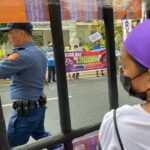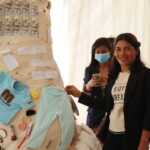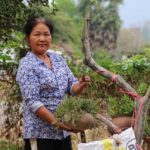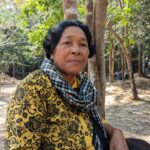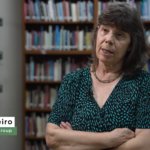Judy Pasimio of Lilak, an indigenous women’s rights group in the Philippines, interviews a native (“lumad”) woman named Fintailan Lenora Mokudef. She is a Teduray leader who joined others from the Bangsamoro area of the Philippines in traveling to Manila from May 19-21, 2014, to demand the recognition of indigenous identity and full inclusion of indigenous rights in the Bangsamoro Basic Law.
Lumad refers to the non-Moro indigenous peoples in Mindanao. The Teduray, along with Lambangian and Dulangan Manobo peples, are the Lumad within the core area of the proposed Bangsamoro political entity.
TRANSCRIPT: Lumad in the Bangsamoro: Dreams and Fears
I am Lenora Mokudef from Upi, Maguindanao. I belong to the Teduray tribe. I am part of the Teduray Lambangian Women’s Organization.
What are your dreams as a Teduray woman?
As a Teduray woman, I dream of genuine peace, to live peacefully and to have unity in our place, and more importantly, to have progress and development in our area and our livelihoods.
What is the prevailing peace and development situation?
At present, we can say there is peace to a certain degree, but it’s not complete peace. Because there continues to be discrimination and continuing conflict like what we see happening in the community around the issue of land. There are people who encroach into our territories claiming our lands as their own, but if we look at the history, these people have no right over these lands because these lands are owned by the Tedurays. These lands are part of our ancestral domain. For us, there will be no tranquility for as long as there continue to be armed groups in the area. We believe that the presence of these armed groups leads to conflict. We are fearful of several armed groups. The civilians are often caught in the middle of the armed conflict between these groups. I understand development as a situation free from conflict, where people can live in peace, and of course have the means to sustain their livelihood.
Do you think that lasting peace and genuine development for the indigenous peoples are already within reach under the proposed Bangsamoro Basic Law?
Not yet. As of now, the rights of indigenous people are being left out of the Bangsamoro Basic Law. In particular, our rights over our ancestral domain, which together with the issue of identity, are the most contentious issues and the most important issues for the tribe – our ancestral domain and our identity. If we lose these, we will never achieve genuine peace. We can only say we have achieved genuine peace when we can freely live within our ancestral domain and have our identity recognized.
What steps have you taken to ensure that the rights of indigenous peoples would be recognized under the Bangsamoro Basic Law?
We have gone through legal processes. Our leaders have explored various ways to convey to the Government of the Philippines and the Moro Islamic Liberation Front that we are here and hope our needs will be addressed in the Bangsamoro Basic Law. Otherwise the so-called peace process will be meaningless for us. For genuine peace to be realized, no one should be left behind, and the rights of everyone are recognized.
What is your appeal to President Aquino?
I appeal to the president as someone who should really be concerned and one who should look closely at what should be included in the Law for him to see the necessity of a full recognition of our rights as Teduray, with our own territory and distinct identity.

